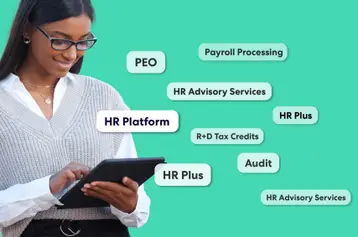
Table of contents
- 1.Why?
- 2.
- 3.Some other missed opportunities for employers include:
They’re the last thing you want to think about amid a hiring process already full of delicate song and dance. One false step, and you’ll lose that top prospect to the savvy startup with “Kombucha Tuesdays.”
The truth, you know, is that benefits can be the bedrock of a thriving workplace culture, especially for small and midsized businesses. Take TriNet customer, ALOHA, a 10-employee brand specializing in organic, plant-based products.
“We’re a small company, right? So, we can't offer the same kinds of base salaries that larger corporations have,” says CMO Alexandra Stankiewicz. “But we can have really solid benefits, it makes a really big difference.”
“Not taking advantage of benefits is massive opportunity missed,” adds TriNet CEO Burton Goldfield. In fact, he says, every benefits decision can be reduced to a simple equation. “Many employers look at benefits as a financial calculation, but what they have to do is look at them as a value calculation. With benefits, there is a real opportunity for companies to attract and retain better people.”
Thinking of benefits as a competitive advantage rather than an albatross starts with understanding that there is a major perception gap between the benefits employees want and the benefits employers think they want.
We’re here for a wakeup call. To help employers begin to spot where a value gap might exist in benefit offerings, TriNet surveyed 1,600 employees and owners of SMBs (TriNet customers) to find out which benefits matter most to employees and employers. Spoiler alert: the biggest gap has to do with unlimited paid time-off. While 63% of employees rated it as important, only 27% of employers did.
Why?
“PTO is a hefty investment for any business and, in my experience, that doesn’t change whether the PTO is limited or not,” Goldfield says. “I will say that, if an individual employee abuses the unlimited PTO, the issue is more likely one of poor performance and lack of work ethic with that particular employee and not necessarily a problem with your PTO policy.”
Commuter benefits (or lack thereof) are another way employers are losing out on top talent. The majority of employees (53%) rate it as important while less than a third of employers (31%) think so. “Commuter benefits are a minimal expense to the employer, and employees love them,” Goldfield says, further recommending that when posting a job, an employer could consider slightly reducing a salary in order to offer commuter benefits.

Some other missed opportunities for employers include:
- Investment opportunities: employees (83%) v. employers (67%);
- Mobile work options: employees (75%) v. employers (64%);
- Paid volunteer time: employees (40%) v. employers (26%);
- Paid parental leave: employees (62%) v. employers (58%);
- And non-traditional benefits: employees (43%) v. employers (32%).
The basics — like healthcare — are still important, too. Though, that is one area where employers (100%) are over-indexing on the importance to employees (92%). “To have payroll and benefits locked in, to be able to offer high-quality healthcare, to be able to offer a 401K plan — allows us to free up our time for creating great content, for having great customer interactions, for following up on emails,” says Peter Yuskauskas, VP of Marketing and Retail at New York-based Brompton Bikes. “Having these benefits actually helps generate business.”
Ultimately, the right benefits — be it a PPO Plan or puppies in the office — are crucial for attracting and retaining lasting, loyal talent. "If it’s free snacks, it’s free snacks,” says Goldfield. "If you have talent willing to move jobs for something like that, offering that is the most brilliant move that company could possibly make."

TriNet Team
Table of contents
- 1.Why?
- 2.
- 3.Some other missed opportunities for employers include:






